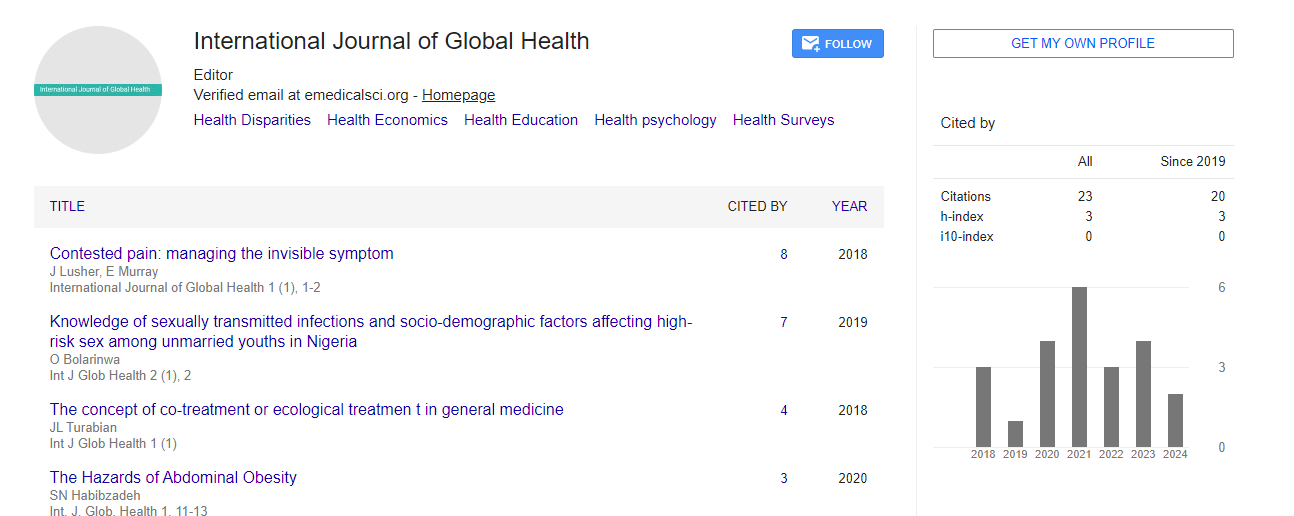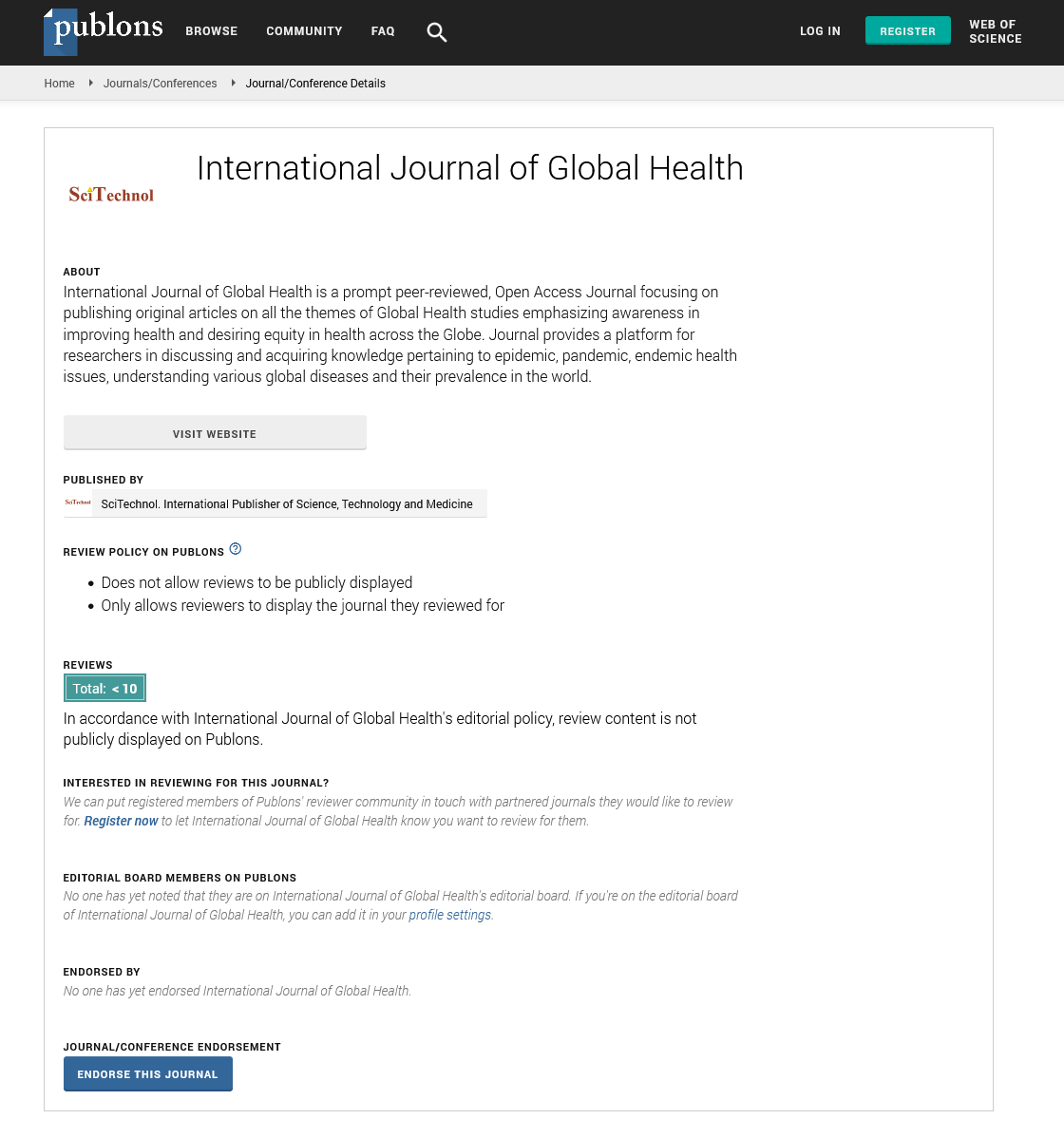Opinion Article, Int J Glob Health Vol: 7 Issue: 3
Calming the Heart: Stress Reduction Techniques for Cardiovascular Disease
Nandita S. Scott*
1Department of Cardiology, University of Texas, Texas, United States of America
*Corresponding Author: Nandita S. Scott,
Department of Cardiology, University of
Texas, Texas, United States of America
E-mail: nandita.s@ut.edu
Received date: 26 August, 2024, Manuscript No. IJGH-24-148982;
Editor assigned date: 28 August, 2024, PreQC No. IJGH-24-148982 (PQ);
Reviewed date: 11 September, 2024, QC No. IJGH-24-148982;
Revised date: 18 September, 2024, Manuscript No. IJGH-24-148982 (R);
Published date: 25 September, 2024, DOI: 10.4172/Ijgh.1000206.
Citation: Scott NS (2024) Calming the Heart: Stress Reduction Techniques for Cardiovascular Disease. Int J Glob Health 7:3.
Description
Cardiovascular Disease (CVD) remains one of the leading causes of morbidity and mortality worldwide. While traditional risk factors such as hypertension, diabetes and smoking are well-recognized, the role of psychological stress in the development and exacerbation of CVD has garnered increasing attention. This study discovers the relationship between stress and cardiovascular health, emphasizing effective stress management strategies for patients with or at risk for cardiovascular disease. Psychological stress activates the body’s “fight or flight” response, leading to increased heart rate, elevated blood pressure and heightened levels of stress hormones such as cortisol and adrenaline. Chronic stress can contribute to the development of various cardiovascular conditions like chronic stress is associated with inflammatory processes that can lead to arterial damage and atherosclerosis. Acute and chronic stress responses can elevate blood pressure, which is a significant risk factor for heart disease. Stress often leads to poor lifestyle choices, such as smoking, excessive alcohol consumption, overeating and physical inactivity. Stress negatively affects sleep quality, which is vital for overall health and recovery. Poor sleep is linked to higher rates of hypertension and heart disease.
Stress management techniques
Effective stress management is essential for both preventing and managing cardiovascular disease. Mindfulness practices, including meditation and deep-breathing exercises, have been shown to reduce stress and improve emotional well-being. Research indicates that mindfulness can lower blood pressure and improve heart rate variability. Patients can start with just a few minutes of mindfulness practice daily, gradually increasing the duration as they become more comfortable. Regular physical activity is one of the most effective stress relievers. Exercise releases endorphins, which enhance mood and reduce feelings of stress. Engaging in aerobic exercises, such as walking, running, or cycling, can also improve cardiovascular health.
Aim for at least 150 minutes of moderate aerobic activity each week, along with muscle-strengthening exercises on two or more days.
Cognitive Behavioral Therapy (CBT)
Cognitive Behavioral Therapy (CBT) is a structured, time-limited therapy that focuses on identifying and changing negative thought patterns. For individuals with cardiovascular disease, Cognitive behavioural therapy can help manage anxiety and depression, thereby reducing stress levels. Studies have demonstrated that Cognitive behavioural therapy can improve quality of life and decrease the incidence of major cardiac events in patients with heart disease. Building a strong social network can provide emotional support and reduce feelings of isolation. Engaging with friends and family, participating in support groups, or joining community activities can help alleviate stress. Sharing experiences and discussing challenges with others can foster a sense of belonging and reduce anxiety.
Effective time management can alleviate stress by reducing feelings of being overwhelmed. Setting realistic goals, prioritizing tasks and delegating responsibilities can make a more balanced lifestyle. Additionally, relaxation techniques such as yoga, tai chi and progressive muscle relaxation can promote physical and mental relaxation, helping to lower stress levels. A heart-healthy diet plays an essential role in managing stress and overall cardiovascular health. Consuming a diet rich in fruits, vegetables, whole grains, lean proteins and healthy fats can improve mood and reduce stress. Avoiding excessive caffeine and sugar can also help maintain stable energy levels and mood. Furthermore, prioritizing adequate sleep hygiene is essential, as quality sleep is vital for emotional regulation and stress management. Healthcare providers play a vital role in recognizing stress as a significant factor in cardiovascular health. Routine assessments of patients’ mental health, stress levels and coping mechanisms can facilitate early intervention. Providers should incorporate discussions about stress management into regular health check-ups and encourage patients to engage in the aforementioned strategies. Referral to mental health professionals, when necessary, can further enhance patient care.
Conclusion
Stress management is an essential component of cardiovascular disease prevention and management. By implementing techniques such as mindfulness, physical activity, cognitive behavioral therapy and fostering social support, patients can significantly reduce their stress levels and improve their overall cardiovascular health. The understanding between stress and heart disease continues to evolve, prioritizing mental well-being alongside physical health is essential for achieving optimal patient outcomes. Empowering individuals with the tools and knowledge to manage stress can lead to healthier, more fulfilling lives, ultimately reducing the burden of cardiovascular disease.
 Spanish
Spanish  Chinese
Chinese  Russian
Russian  German
German  French
French  Japanese
Japanese  Portuguese
Portuguese  Hindi
Hindi 
